
Recent geopolitical events have shaken the world and many people in Russia are now looking for solutions to unblock websites and access content online. Our focus today is on giving you simple and reliable solutions to technical problems. Specifically, we are going to show you exactly how to unblock websites in Russia in a way that is fast, safe, and easy.
As with nearly all things technical, there are different solutions for unblocking websites — some that are safe and secure, and others that carry more risk. We will examine these different techniques, while also discussing the pros and cons of each one. Additionally, these techniques should also work in other locations where blocked websites are a problem, whether in other countries around the world or perhaps with work or school networks.
But before we dive into the technical details, let’s get one thing straight. You need to be smart online, particularly with what you say and post under your real identity. From a recent Reuters report:

In short, you need to be very careful with what you say and post on social media and any other website. It also means you should only access the internet in Russia through the encryption and safety of a good VPN (virtual private network). We’ll explain why a VPN is the best solution further below.
Why are websites being blocked in Russia?
The short answer to this question is relatively simple. The Russian government wants to block websites to prevent people in Russia from accessing certain content online.
Internet censorship in Russia is getting lots of attention today, but it’s actually nothing new. In fact, Russia has been actively blocking numerous websites for at least the past ten years, perhaps longer. Since 2012, Russia has maintained a centralized database of websites called the “Single Register” that it actively blocks.

The regulatory agency in Russia that maintains this list, and enforces the blocking of these websites, is called Roskomnadzor. Originally, the website blocks were justified to prevent access to harmful content. However, these actions have expanded over the years. Today, all sorts of content and websites are being blocked for people living within Russia.
Internet service providers, which are regulated by Roskomnadzor, are responsible for carrying out the website blocks. To do this, internet service providers will employ DNS blocking techniques.
A VPN will be an effective solution to the problem with these added benefits:
- When connected to a VPN server, your internet service provider will not be able to see anything you do online. All traffic between your device and the VPN server will be encrypted and unreadable to your internet service provider (and other third parties they share data with).
- The blocks being used by your internet service provider will no longer work. When connected to a VPN server outside of Russia, you will be able to easily access websites that are blocked in Russia.
- Your IP address and location will be hidden. When you connect to a VPN server, you will broadcast the VPN server’s IP address and location, wherever that server happens to be located.
What types of websites are being blocked in Russia?
As we noted above, the first round of websites blocks was rather limited in scope. These early blocks included the following types of websites:
- Drug abuse
- Drug production
- Illegal pornographic content
- Suicide methods
Today, however, the website blocks have expanded greatly. Now, the following categories of websites are also blocked:
- Anything classified as “extremist content” by Russian authorities.
- Websites that are critical of the Russian government and/or government policies.
- Religious websites, such as the Jehovah’s Witnesses and some Islam websites
- Social media websites (Facebook, Twitter, Instagram, and more)
- International news websites, such as the BBC and Deutsche Welle
- Video streaming websites, including Netflix and TikTok
Right now, since the conflict in Ukraine has been in the spotlight, we have seen more websites added to the list, particularly anti-war websites and any news, platform, or outlet that is critical of the Russian government.
How can a VPN help to unblock websites in Russia?
Think of a VPN like your own encrypted digital tunnel that allows you to safely and securely access the outside digital world, free from content blocks and restrictions. This illustration paints a picture of how a VPN gives you access to content, while also providing you with more online privacy and security:

Aside from giving you access to blocked content, a VPN is also a critical tool for online privacy and security thanks to the encryption it offers.
Why a VPN is currently the best solution for unblocking websites in Russia
One of the reasons we recommend a VPN as the tool to use for unblocking websites is because a VPN has added privacy and security benefits, above and beyond just accessing content. A VPN will:
- Hide your real IP address and location
- Encrypt your internet traffic
- Prevent your internet service provider from monitoring and logging everything you do online
- Provide an additional layer of security
Considering the current laws in Russia and the fact that internet service providers log everything you do online, you will want to be connected to a good VPN at all times in Russia. This is just basic common sense and digital self-defense in today’s world.
What are the best VPNs for unblocking websites in Russia?
The goal of this guide is primarily focused on unblocking websites in Russia. And to do that task, we primarily recommend VPN services. If you really want to get into the details on this topic, we have a guide on the best VPNs for Russia.
In this guide, however, our primary focus is on unblocking websites. To do this consistently and reliably, a VPN needs to have a large server network that can get access to content from around the world. All of the VPNs we recommend below have 3,000+ servers in 60+ countries around the world.
There are also some smaller VPN services that may perform well in Russia, but because they have a smaller server network, they are not ideal for unblocking websites. Two examples of this are with Perfect Privacy and also VPN.ac.
Now let’s examine the best VPNs for unblocking websites in Russia:
1. NordVPN – Best VPN to unblock websites in Russia and beyond
| Website | NordVPN.com |
| Based in | Panama |
| Logs | No logs (audited) |
| Price | $2.99/mo. |
| Support | 24/7 live chat |
| Refund | 30 days |
| Deal | 74% Off Coupon |
NordVPN tops our list as the best VPN to unblock websites in Russia. It has a huge selection of secure VPN servers around the world: 5,400+ servers in 60 countries. This gives you a large selection of servers to unblock websites wherever you are located. NordVPN also has servers close to Russia, which means you will get the fastest speeds and best performance (with low latency). These servers are located in Estonia, Latvia, Lithuania, and Ukraine.
NordVPN also boasts some great privacy and security features. All NordVPN apps include a VPN kill switch to keep your traffic secure, as well as strong encryption. Here are some of the advanced privacy and security features with NordVPN:
- Threat Protection feature that will block ads, tracking, and malware domains from infecting your device
- Double-VPN servers that encrypt traffic over two different locations
- Tor-over-VPN servers that encrypt traffic with both the VPN server and also the Tor network
- Obfuscated servers to conceal your VPN traffic as regular HTTPS encryption
- Split tunneling feature that allows you to route certain apps or websites outside of the VPN
(opens in a new tab)”>See all NordVPN features here >
NordVPN supports the WireGuard VPN protocol, which is faster than legacy VPN protocols like OpenVPN and IPSec. Additionally, NordVPN also works well with most streaming sites. It is one of the best VPNs for Netflix and also works for streaming Hulu, Amazon Prime, Disney Plus, and more.
Below I’m using the NordVPN Windows app to connect to a VPN server in Latvia. NordVPN performed well in all of our VPN tests for this review.
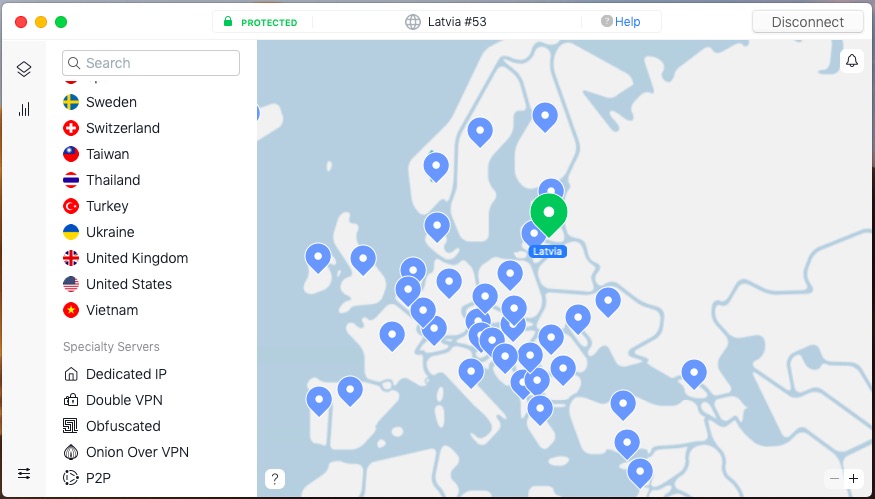
NordVPN offers apps for Windows, macOS, Linux, and iOS devices. It also has a dedicated app if you need a VPN for Firestick or other streaming devices.
All NordVPN subscription plans come with a full 30 day money-back guarantee as well as 24/7 live chat support.
NordVPN’s Black Friday Deal is live:
Get 74% Off NordVPN with 2-year subscriptions plus 3 extra months:
(Coupon is applied automatically; 30 day money-back guarantee.)
See our NordVPN review to learn more about how this VPN performs.
2. Surfshark – A cheap and reliable VPN to access websites in Russia
| Website | Surfshark.com |
| Based in | The Netherlands |
| Logs | No logs (audited) |
| Price | $1.99/mo. |
| Support | 24/7 live chat |
| Refund | 30 days |
| Deal | 87% Off Coupon |
Next up on our list is Surfshark. This is a no-logs VPN based in The Netherlands. Surfshark has a great track record going back to 2018 when it first came on the market. It is the cheapest VPN on our list at only $2.19 per month with the coupon below.
Like NordVPN, Surfshark also has a large server network around the world to unblock websites while in Russia (or anywhere else). This network is comprised of 3,200+ servers in 100 countries. Surfshark also has servers close to Russia in the following locations: Estonia, Latvia, and Ukraine.
Surfshark performed well in all of our tests — and it also stacks up well against other VPNs. Like NordVPN, Surfshark supports the WireGuard VPN protocol with excellent speeds. You can see speed tests in the NordVPN vs Surfshark comparison where Surfshark hits 397 Mbps.
Surfshark offers secure VPN apps for Windows, macOS, Android, and iOS devices. Like NordVPN, Surfshark also offers some great security features:
- CleanWeb – This is a VPN ad blocking feature that filters ads, trackers, and malware domains.
- MultiHop – This feature allows you to route VPN traffic securely through two different servers.
- Antivirus – For those who want it, you can add an additional antivirus plan to your account (paid addition).
Here is the Surfshark Windows VPN app we tested out:
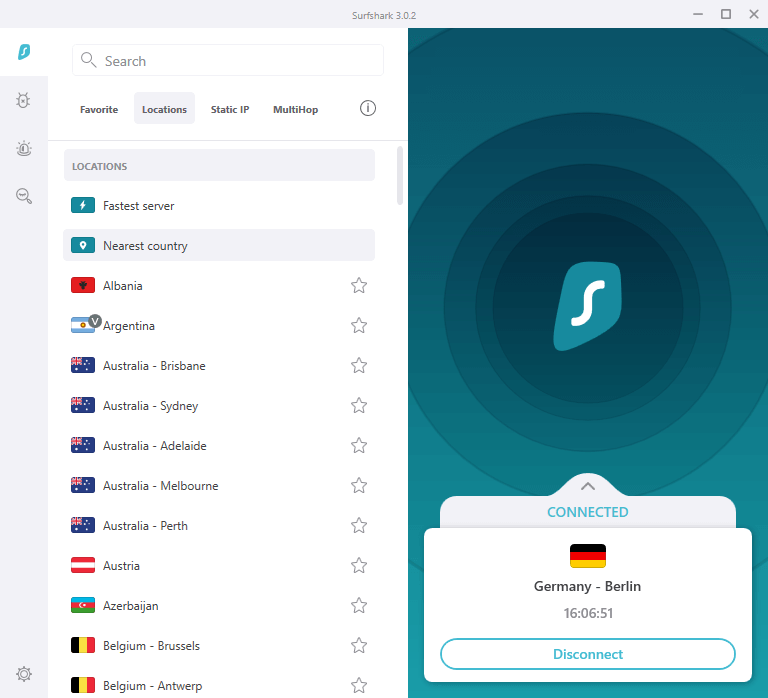
Surfshark has all the features you will find in a premium VPN, with speeds to match. Taking advantage of the coupon below will also save you some money, with Surfshark coming in at under $3 per month. All Surfshark VPN plans come with a 30 day money-back guarantee and 24/7 live chat support.
Surfshark VPN Coupon:
Get 87% off Surfshark VPN plus an additional 4 months extra with the coupon below:
(Coupon is applied automatically; 30 day money-back guarantee)
Check out our Surfshark review for more details on this rising VPN service.
3. ExpressVPN – A reliable and secure VPN for unblocking websites anywhere
| Website | ExpressVPN.com |
| Based in | British Virgin Islands |
| Logs | No logs (audited) |
| Price | $6.67/mo. |
| Support | 24/7 live chat |
| Refund | 30 days |
| Deal | 49% Off Coupon |

Next up on list of VPNs for unblocking websites in Russia is ExpressVPN. ExpressVPN is another no logs VPN service that is based in the British Virgin Islands. This is a secure and private jurisdiction that does not have any data retention requirements or other privacy red flags.
ExpressVPN boasts a large server network of 3,000+ servers in 105 countries. This gives you plenty of opportunities to unblock websites in Russia or anywhere else in the world. They offer VPN apps for Windows, macOS, Linux, Android, iOS, and VPN routers.
ExpressVPN currently does not support the WireGuard VPN protocol, but they do have the Lightway protocol. Lightway is similar to WireGuard, but it is self-developed and not quite as fast in our tests. You can see this in the NordVPN vs ExpressVPN comparison, where NordVPN had a big edge with speed tests.
ExpressVPN is also a bit limited on features. They do offer a split tunneling VPN feature that allows you to route traffic outside of the VPN tunnel (NordVPN and Surfshark have this feature, too). Additionally, ExpressVPN apps have a VPN kill switch to secure traffic, as well as strong encryption standards.
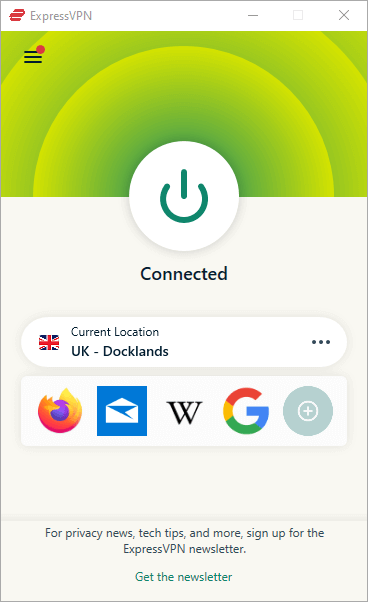
All ExpressVPN plans come with a full 30 day money-back guarantee. They also have 24/7 live chat support available through the website. Below is a coupon for three months free.
To see how ExpressVPN performs in real-world tests, check out our ExpressVPN review here.
Rule number one: be smart online
First, let’s state the obvious. You need to be smart when going online in Russia.
If you are logging into any service that is linked to your identity (like social media websites), email accounts, etc., you need to be very careful with what you say and post. Think China and the social credit system — don’t say anything that could get you into trouble.
And you also need to remember that no VPN, or any other privacy tool for that matter, can protect you against bad decisions. In other words, all the encryption and privacy in the world will not help you if you then log into Facebook and post anti-government memes. So again, you need to first be smart, above anything else.
Can you use Tor for unblocking websites in Russia?
Right now, Tor is not a good solution for unblocking websites in Russia. Since December 2021, Russia’s regulatory agency has been actively blocking Tor. This was confirmed not only by the Tor Project, but also by different organizations that monitor the Tor network around the world.
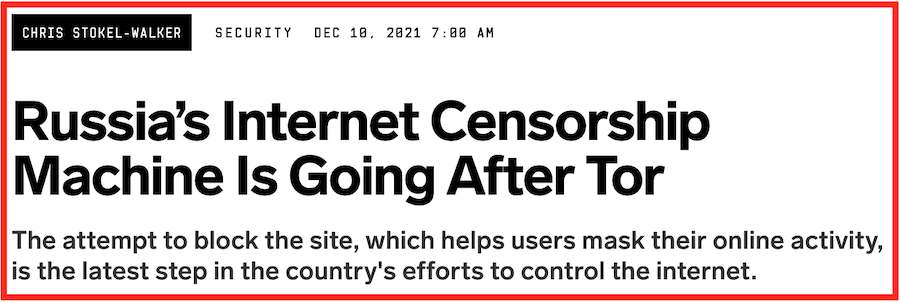
From a recent report in Wired magazine:
Some people are being sent to a blocked page instead of the Tor Project website. Others appear to be subject to a man-in-the-middle attack over their TLS connection, which secures data sent over the internet end-to-end, when trying to connect. More still are finding their connection reset repeatedly when the TLS handshake is initiated, attempting to frustrate their access. That latter method would indicate Roskomnadzor utilized deep packet inspection (DPI) to filter packets headed for Tor, suggesting they’ve been sniffing traffic as it passes through ISPs, say OONI.
It’s interesting to see that people using the Tor network in Russia are being subjected to man-in-the-middle attacks. For years we have warned about the risks of the Tor network and the fact that anyone can operate Tor nodes and manipulate traffic. For these reasons and more, you would be better off avoiding Tor and using a good VPN for unblocking websites in Russia. (See also our VPN vs Tor guide for more info on this topic.)
Can you use third-party DNS for unblocking websites in Russia?
Third-party DNS also comes with risks and drawbacks that prevent us from recommending it.
Perhaps most importantly, third-party DNS provides no privacy or security. When you use a third-party DNS provider, you are simply replacing your internet service provider’s DNS servers with DNS servers from another party. This creates the following problems:
- The third-party DNS service could be logging every website you visit (and selling the data to others). This is the case with many of the large third-party DNS services.
- Your IP address remains exposed. When you use third-party DNS, your real IP address and location remain exposed to the world. This is neither private nor secure, and could put you in danger.
- Your ISP can still see everything. Even if your internet service provider is not handling your DNS requests, it can still see every website (and IP address) you visit. It’s that simple. Even encrypted DNS (like DNS over HTTPS) does not solve these problems because your traffic remains exposed to your ISP.
People who recommend encrypted DNS as a solution are usually uninformed. A good VPN will handle all of your DNS encrypted in the tunnel, while also encrypting your traffic and concealing your IP address and location. For the drawbacks of encrypted DNS, see this article:
Why encrypted DNS is ineffective
Can you use a free VPN for unblocking websites?
For years, we have been warning about the dangers of free VPN services. Just like with the Tor network, with free VPNs, anything goes. There are a plethora of free VPNs available that collect your data and sell it to third parties.
This is the basic business model of free VPNs: to collect data and exploit the user.
One in-depth study looked at over 270 free VPN apps and found the vast majority to be insecure and dangerous:. Here were the alarming findings from the study on free VPNs:
- 84% will leak your IP address
- 82% will attempt to access your sensitive data
- 75% utilize third-party tracking
- 38% contain malware
- 18% don’t even encrypt your data (leaving you completely exposed)
Once again, free VPNs exploit their users for profit. If you don’t believe me, then read this study and thank me later.
If something is free, you are the product.
Conclusion
In this guide, we have taken a deep dive into the topic of unblocking websites in Russia.
As of today, the best method for unblocking websites in Russia remains a good VPN service. Unfortunately, the big drawback here is that good VPNs cost money. But when you consider the risks involved, including years in jail, you do not want to cut corners or take any chances.
In the future, the Tor browser (and Tor network) may work in Russia, particularly if you use a bridge. Nonetheless, the inherent problems with Tor remain. It is an insecure network where anyone can operate Tor nodes and exploit those who use it. This has been going on for years and it continues today.
This means you are left with using a good VPN service. And if Russia goes down the path of attempting to block VPNs, then you will just need to use a VPN with Obfuscation features. All three of our recommended VPNs have that capability. Our top recommendation remains NordVPN due to it’s fast speeds, unblocking capability, and extra privacy and security features.
We wish you good luck and safety in these crazy times we live in. And don’t forget rule number one: be smart online.

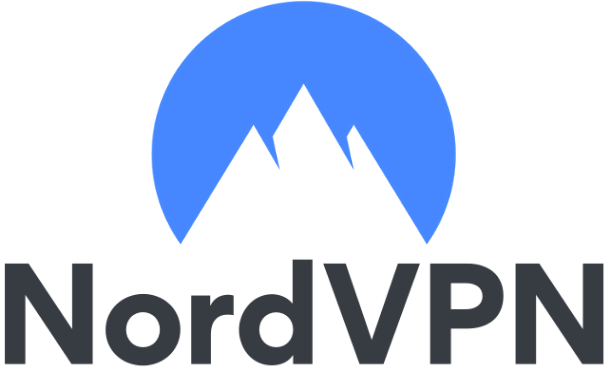
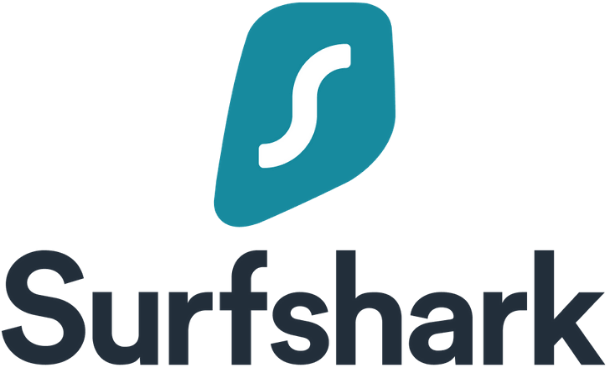
Just so people know, all of these VPN’s are banned in Russia & if an individual is discovered to have them on a device, they’ll be fined:
ExpressVPN
NordVPN
VyprVPN
IPVanish
Hola VPN
ProtonVPN
Opera VPN
KeepSolid VPN Unlimited
Speedify VPN
Betternet
X-VPN
Lantern
PrivateTunnel
Cloudflare WARP
Tachyon VPN
I’ve read on a couple of forums that a number of the ones listed aren’t working at all. Astrill have some interesting tech, but…are they truly trustworthy? I remember a couple of people saying they weren’t (I’d read about Hotspot Sheild), can anyone (or Sven) elaborate?
According to the Russian government’s announcement here:
https://rkn.gov.ru/news/rsoc/news73836.htm
the VPNs listed in the link above are getting blocked by internet service providers, as directed by the government agency Roskomnadzor. This means the VPN’s websites is not accessible. That does not mean you can’t use the VPN, it just means that Roskomnadzor is blocking access to the VPN’s website.
Hi Sven,
I think you are assuming an independent judiciary, and policing and security organisations that follow the rule of law.
It is apparent this doesn’t exist in the Russian Federation.
With 99 balloons,
BoBeX